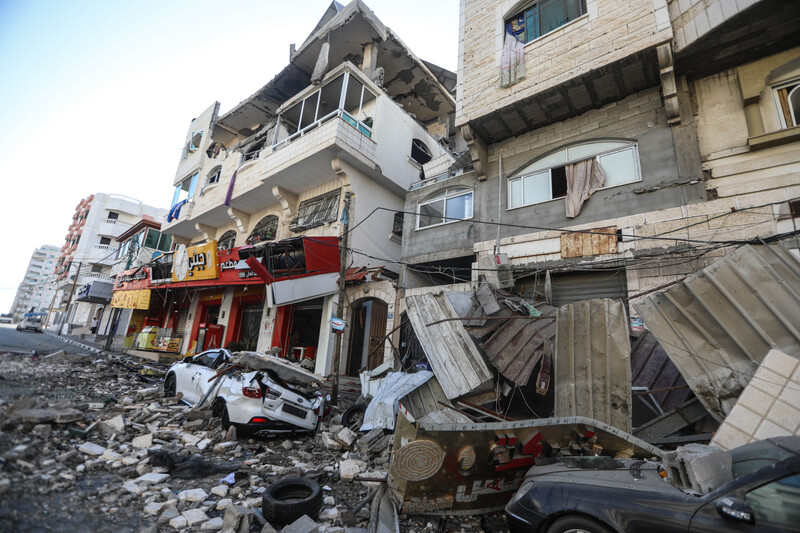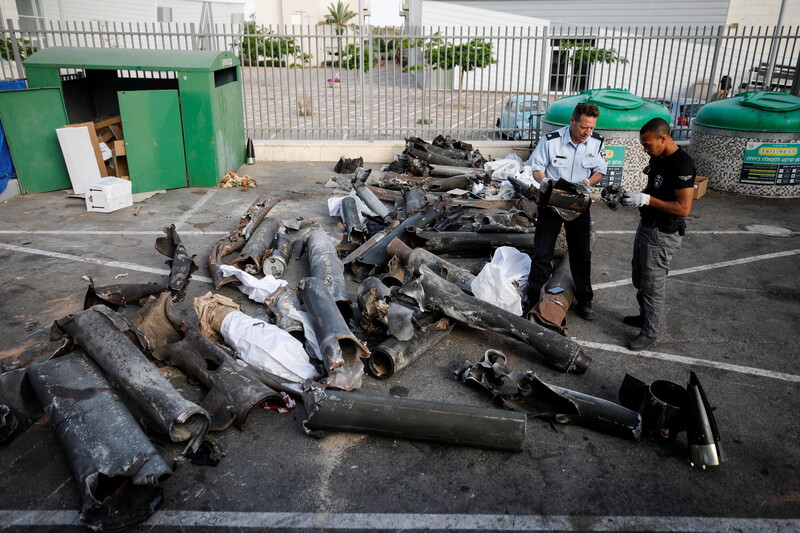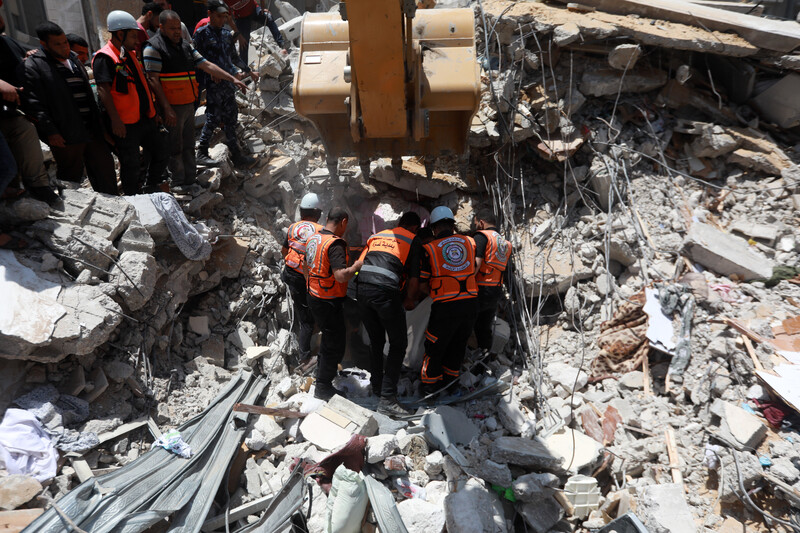How Human Rights Watch favors Israel

A neighborhood in Beit Hanoun, northern Gaza, destroyed in Israeli attacks, 21 May 2021.
ActiveStillsIsrael used weapons made by Chicago-based Boeing to destroy residential towers in Gaza, massacring families in their homes in May, a new report by Human Rights Watch confirms.
The documentation contained in Human Rights Watch’s investigation is valuable and necessary and will serve those seeking to burst Israel’s bubble of impunity to prevent the next bloodbath in Gaza.
But the group’s equation of alleged war crimes committed by Israel and Palestinian armed groups in Gaza perpetuates the myth of parity between a colonizing state and its subjects.
The New York-based group said it “investigated three Israeli strikes that killed 62 Palestinian civilians where there were no evident military targets in the vicinity.”
The testimony of Palestinian survivors and witnesses to these Israeli strikes is harrowing.
Parents describe recovering their children’s torn-up bodies. The sole survivor of one strike recounts his entire family being obliterated without warning in a matter of seconds.
Those interviewed by Human Rights Watch deny Israeli claims of militant activity in the vicinity of the targets at the time of the three attacks investigated by the group.
They include a series of strikes on al-Wihda street in central Gaza City on 16 May, killing 44 civilians, including 18 children. Twenty-two members of the al-Qawlaq family, ranging from 6 months to 90 years, were among the victims.
Israel claimed that it was targeting an underground command center but admitted “to not knowing its size or exact location at the time of the attack,” Human Rights Watch states.
The group adds that Israel has not proven “the existence of tunnels or an underground command center in this vicinity.” Nor has Israel explained why it did not warn residents to evacuate their buildings before the deadly attack.
“Human Rights Watch did not find any evidence of a military target at or near the site of the airstrikes, including tunnels or an underground command center under al-Wihda street or buildings nearby,” the group states.
Israel used 1,000-kilogram GBU-31 series bombs mounted with Boeing’s Joint Direct Attack Munition guidance kit in the al-Wihda street strikes.
According to Human Rights Watch, Israel also used weapons made by Boeing and exported by the US in the 15 May airstrike in Gaza City’s Beach refugee camp that killed two women and eight of their children.
Amnesty International has called for a “comprehensive arms embargo on Israel” and urged states to immediately suspend all transfers of weapons and military equipment.
Amnesty also calls for the same measures to be imposed on Palestinian armed groups, though neither the US nor any European states that arm Israel supply weapons to Palestinian resistance organizations.
Human Rights Watch takes a meeker approach.
“Israel’s partners,” including the US, should “condition future security assistance to Israel” on improvement to “its compliance with the laws of war and international human rights law, and to investigate past abuses,” the group states.

A Gaza City street damaged by Israeli bombing, 12 May.
ActiveStillsGiven the scope of the crimes it has documented, it is baffling why Human Rights Watch would not just call for an arms embargo on Israel. It has done so for other countries including Ethiopia, Myanmar, Saudi Arabia, South Sudan, Syria and the United Arab Emirates.
In its Gaza report, Human Rights Watch does not call for targeted sanctions on Israel as it has in many of the aforementioned cases. However, the group also recently called for targeted sanctions against Lebanese authorities responsible for the Beirut port explosion last August that killed 218 people.
In a new report on the explosion, Lama Fakih, a program director with the rights group, states that “Despite the devastation wrought by the blast, Lebanese officials continue to choose the path of evasion and impunity over truth and justice.”
Certainly, the same can be said for Israel, where B’Tselem, a leading human rights group in the country, has called its military’s self-investigation mechanism a “fig leaf” for the occupation.
But Human Rights Watch doesn’t call for targeted sanctions against Israeli officials as it does their Lebanese counterparts, though it acknowledges the “long track record of failing to investigate laws of war violations” committed in Gaza. (Palestinian armed groups operating in Gaza are already subject to sanctions by being listed as terror organizations in multiple countries.)
“The UN Human Rights Council should immediately authorize an investigation, and other countries should impose targeted sanctions on those implicated in ongoing abuses and efforts to impede justice,” Fakih says regarding Lebanon.
In its report on war crimes in Gaza, Human Rights Watch notes the commission of inquiry established by the Human Rights Council in late May to probe Israel’s repression against Palestinians as a whole.
Human Rights Watch encourages an examination of not only “unlawful attacks” by Israel and Palestinian armed groups in May but also “the larger context” of Israel’s “discriminatory treatment of Palestinians.”
The rights group called for targeted sanctions in its report on Israeli apartheid published earlier this year. But why doesn’t it call for an immediate measure to help prevent the next episode of bloodshed in Gaza?
Some 260 Palestinians were killed in Israeli attacks on Gaza during May, at least half of them civilians. Several Palestinians also died due to rockets fired in Gaza that fell short of the boundary with Israel.
Twelve people in Israel were killed by rocket fire from Gaza during the 11-day escalation in May. They included three foreign workers, two children and one soldier.
Human Rights Watch concludes that both “Israeli forces and Palestinian armed groups carried out attacks … that violated the laws of war and apparently amount to war crimes.”
The group, which notes that Israel refuses to allow its international staff access to Gaza, said it would “separately release findings on rocket attacks by Palestinian armed groups.”
The rights group says that Israeli and Palestinian violations should be examined by the International Criminal Court, which launched an investigation into war crimes in the West Bank and Gaza Strip earlier this year.
The ICC defers to a country’s internal investigations, where they exist and are genuine, under the principle of complementarity which holds that “states have the first responsibility and right to prosecute international crimes.”
“The Israeli military and Palestinian authorities have a long track record of failing to investigate laws of war violations committed in or from Gaza,” Human Rights Watch states.
Its report also quotes Gerry Simpson, a Human Rights Watch representative, stating that “Israel and the Palestinian authorities have shown little or no interest in addressing abuses by their forces.”
Simpson adds that “global and national judicial institutions should step up to break the vicious cycle of unlawful attacks and impunity for war crimes.”
False parity
Human Rights Watch’s framing suggests that Israel and Palestinian resistance groups in Gaza bear equal responsibility for war crimes and that their alleged crimes are equal in scope and severity.
It draws a false parity between a colonial power with one of the world’s strongest military arsenals, on the one hand, and stateless guerrilla fighters in a besieged and repeatedly battered territory, on the other.
Armed groups in isolated Gaza lack the capacity to develop precision-guided weapons like that used by Israel to target civilian infrastructure.
Human Rights Watch faults groups in Gaza for launching “unguided rockets and mortars towards population centers, violating the prohibition against deliberate or indiscriminate attacks against civilians.”
The rights group did not substantiate the implied claim that Palestinian resistance groups aimed toward Israeli population centers and not military targets, as the writer Helena Cobban observes.
A video released by the Qassam Brigades, the armed wing of Hamas, appears to show Palestinian fighters deliberately aiming at an Israeli military jeep. An Israeli soldier died as a result of that anti-tank guided missile fired from Gaza.
Human Rights Watch repeatedly states that Palestinian groups fired rockets toward Israeli “population centers.” But the report does not use this same phrase concerning Israeli fire in Gaza, which is one of the most densely populated places in the world.
According to Human Rights Watch, “Lacking guidance systems, the rockets are inherently indiscriminate when directed toward areas with civilians.”

Israeli police spokesperson Micky Rosenfeld and a municipality security officer look at a collection of rockets fired from Gaza at a police station in Ashdod, 20 May.
ReutersIt is hard to see why that same logic wouldn’t apply to Israel’s 1,000-kilogram bombs dropped anywhere in densely populated Gaza. By this reading, any Israeli fire into Gaza would be directed toward Palestinian “population centers.”
The same is true of 155mm artillery shells. Israel lobbed hundreds of those shells into Gaza in May, as it has during previous assaults on the territory.
Such artillery systems can only be aimed to fall within a circle whose radius may extend hundreds of meters from the intended target.
This is a point Human Rights Watch made in its 2007 report “Indiscriminate Fire.” It states that the “expected lethal radius” for the 155mm high explosive projectiles regularly used by Israel to attack Gaza “is reportedly between 50 and 150 meters and the expected casualty radius is between 100 and 300 meters.”
“Regardless of the legitimacy of the target in theory, the limited accuracy of 155mm howitzers, which [Israeli army] lawyers acknowledged in interviews with Human Rights Watch, endangered civilians,” the 2007 report states.
Yet in its report on Israel’s attacks on Gaza in May, Human Rights Watch nowhere acknowledges the inherently indiscriminate nature of the weapons used by Israel – a glaring double standard.
“Security”
Palestinians lack an advanced defense system like that used by Israel to intercept rockets fired from Gaza.
The New York Times reported that most rockets fired from Gaza during May were shot down by Israel’s missile interception system or landed in unpopulated areas.
Palestinians, by contrast, do not have any system to intercept Israel’s bunker-buster bombs that reduce towers to rubble, just as they have no defense against Israel’s indiscriminate shelling.
It is ludicrous to compare the capacity of Israel versus Palestinian armed resistance groups and therefore absurd to equate their human rights implications.
Yahya Sinwar, the leader of Hamas in Gaza, told Vice News in May that Palestinians do not use unguided rockets by choice.
“Israel, which possesses a complete arsenal of weaponry, state-of-the-art equipment and aircraft, intentionally bombs our children and women, on purpose,” Sinwar said.
“You can’t compare that to those who resist and defend themselves with weapons that look primitive by comparison. If we had the capabilities to launch precision missiles that targeted military targets, we wouldn’t have used the rockets that we did.”
It is unlikely that Human Rights Watch’s forthcoming report on rockets used by Palestinian groups will recommend that the US and EU arm Palestinians with precision weapons like they arm Israel.
It is also unlikely that Human Rights Watch will suggest that the “partners” of armed groups in Gaza condition “security assistance” on their compliance with international law as it does with Israel.

Palestinian rescue workers search for bodies and survivors under the rubble of a residential building in Gaza City bombed by Israel, 16 May.
ActiveStillsThe rights group is not likely to take for granted “security assistance” to Palestinians living under the boot of military occupation as it does world powers arming the Israeli military.
The very use of the phrase “security assistance” concerning Israel’s incremental genocide in Gaza reveals Human Rights Watch’s inherent bias.
Human Rights Watch uses that euphemistic language again when referring to “Israeli security forces” in East Jerusalem.
“Security forces” is a wholly inappropriate term for personnel tasked with quelling protest and enforcing discriminatory and illegally applied Israeli domestic law in occupied territory so that Palestinians may be removed and replaced with Jewish settlers.
Human Rights Watch does not use the language of “security” in relation to armed groups in Gaza, home to two million stateless Palestinians, two-thirds of whom are refugees.
Israel denies them their right to return to their homeland – a right enshrined in international law but denied to Palestinians for decades.
In its forthcoming report on rocket fire from Gaza, Human Rights Watch is unlikely to recommend how stateless refugees can defend themselves without any meaningful accountability measures imposed on Israel.
False moral equivalence
The firing of rockets from Gaza – lacking precision guidance due to technological, trade and manufacturing limitations resulting from decades of de-development under military occupation and Western-backed Israeli sanctions – have indisputably caused loss of human life, albeit on a much smaller scale than that inflicted by Israel with its supposedly “precise” weapons.
According to the yardstick of international law, such rocket fire may well be considered a war crime.
Yet the equation of a military power possessing nuclear weapons and its colonial subjects is parallel to the deceptive and harmful bilateral “peace” negotiations paradigm imposed on the Palestinians for decades, to Israel’s sole benefit.
During this period, Palestinians have seen their material conditions worsen and their land gobbled up by Israeli settlements in violation of international law.
Human Rights Watch, to its credit, has recently called for an approach centered on human rights and accountability rather than the long moribund “peace process,” to which world powers still cling.
The rights group has acknowledged that the pursuit of “Jewish Israeli control over demographics, political power and land has long guided [Israeli] government policy.”
In some cases, Human Rights Watch said, Israel’s violations of Palestinian rights in pursuit of this goal “are so severe that they amount to the crimes against humanity of apartheid and persecution.”
The group briefly mentions this context in its report on alleged war crimes perpetrated by Israel and Palestinian armed groups in May.
Yet Human Rights Watch insists on a “both sides” framing, despite the disparate death toll and destruction, to say nothing of the vast disparity in firepower.
This suggests a moral equivalence between the resistance of a besieged people living under occupation and a colonizing power that seeks the absolute surrender of its subjects’ national and indigenous rights.
The tactics of Palestinian groups shouldn’t be ignored. But unequals should not be treated equally, to borrow a phrase from international law scholar Richard Falk.
Falk wrote after Israel’s 51-day attack on Gaza in 2014 that the “primary human impact … was to leave Gaza bleeding and devastated, while Israel endured minimal damage and dramatically less destructive impacts on its societal order.”
Then, as now, “Israeli damage was repaired almost immediately. In contrast, Israel’s refusal to allow ample reconstruction materials to enter has left substantial parts of Gaza in ruins, with many Gazans continuing to lack adequate shelter, remain homeless and understandably traumatized.”
Human Rights Watch will point to its criticism of both sides to deflect accusations of anti-Israel bias and anti-Semitism.
Indeed, Israel has long sought to undermine the group’s work by denying it access to Gaza and deporting the head of its Jerusalem office.
But as Jonathan Cook observed for The Electronic Intifada in 2006, the “both sides” approach “makes a pact with the devil: It achieves the balance that protects it from criticism but only by sacrificing the principles of equity and justice.”
The utter lack of equity and justice creates the conditions for the alleged war crimes condemned by Human Rights Watch. The “both sides” framework does not and never did apply.
Ali Abunimah contributed research.


No comments:
Post a Comment
Note: only a member of this blog may post a comment.